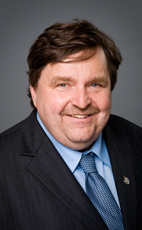Mr. Speaker, I will be sharing my time with the hon. member for Saint-Hyacinthe—Bagot.
In 2013, when I sat on the Subcommittee on International Human Rights, we studied the case of Honduras at length. Therefore, I believe I have enough facts to oppose this bill, which is unacceptable.
The despotic regime that reigns in Honduras is characterized by its anti-democratic practices, its corruption, its failed institutions and its history of human rights violations. Canada should not be signing a free trade agreement with that country.
The NDP believes there are three fundamental criteria when considering a trade agreement. First, does the proposed partner respect democracy and human rights, acceptable environmental and labour standards, and Canadian values? Second, does the proposed partner's economy have significant or strategic value to Canada? Third, are the terms of the proposed agreement satisfactory?
The proposed agreement with Honduras does not meet any of these criteria, as we clearly showed in the previous debates, despite the fact that the Conservatives have used their majority to limit the time to review this bill. Only five hours of debate on a treaty that was negotiated over three years. This is ridiculous. I also find it difficult to understand why Liberal members would agree to signing an agreement with Honduras.
We are promoting an agreement with a brutal dictatorship, and I am choosing my words carefully. By signing this agreement, we are giving legitimacy to a regime put in place following a coup. The Subcommittee on International Human Rights heard several witnesses from Honduras and experts on this issue. I heard horror stories. Since the coup in Honduras, journalists, union representatives and people who are asking for greater democracy are being killed. In fact, they will kill anything they do not like in that country. Honduras is the murder capital of the world, and most of the murders are not even properly investigated by the police.
Professor Gordon of Wilfrid Laurier University, who testified before the committee, said that the possibility of a free election needs to be called into question. Some members of the opposition parties have been assassinated. In 2013, there was an average of 10 killings a month. According to Professor Dana Frank from the University of California, 80% of crimes in Honduras go unpunished. There are many documented cases of police corruption. Between January 2011 and November 2012 alone, the police carried out 149 summary executions of civilians. In January 2013, the United Nations asked for the removal of four judges of the Supreme Court of Honduras for violations of international standards and because there was a serious threat to democracy. In February 2013, the United Nations working group on the use of mercenaries indicated that the Government of Honduras had failed to properly regulate private security companies. These companies are involved in numerous cases of human rights violations, including murders, disappearances, forced expulsions and rapes.
Moreover, censorship is common in Honduras. It is alleged that journalists are corrupted and advertisements are manipulated to ensure that coverage is positive and to silence opponents.
According to the national human rights commission of Honduras, 29 journalists have been murdered since the coup.
This is the question I would ask: if Canadian mining engineers were murdered, what recourse would Canada have? It would have none. There is no justice and therefore murderers are not even prosecuted. It is in the interest of Canadian mining companies to have a certain legal framework in Honduras. I would ask them the following question: what good is a legal framework when there is no rule of law in the country?
Should Canada support, by means of a trade agreement, a government of thugs? The Honduran regime is corrupt. All the stakeholders have said the same thing and even the U.S. Senate acknowledged that this is unacceptable.
Will this agreement benefit Honduras? I seriously doubt it. Two years after the coup, 100% of the increase in income went to only 10% of the population, while poverty increased by 26%. This agreement will only benefit a corrupt elite.
Canada used to be a world leader in foreign affairs, renowned for its ability to help other organizations and other countries become more democratic, freer, fairer to its citizens and more respectful of human rights. However, agreements such as this one, supported by the Conservatives and the Liberals, will make us take a step backwards.
Entering into such an agreement with a corrupt government shows little concern for human rights and sends the message to similar countries that this is acceptable to Canada. The Conservative government and its partners, the Liberals, find that acceptable. We are debating an agreement with a brutal regime, and closure has been invoked.
We are trampling democracy, here and elsewhere, and I am sad to see the Liberal members supporting this process. The Conservative government imposed closure 68 times to end debate. Is that a sign that the government is turning away from democracy?
The agreement with Honduras was negotiated without any transparency and despite repeated requests from stakeholders in various sectors of Canada's economy. The Government of Canada was never willing to make the text of the agreement public during the negotiation process. Given these concerns, I am disappointed that my colleagues from the other parties want to support this treaty. This agreement is stained with the blood of Hondurans.
We risk damaging Canada's international reputation if we enter into a partnership with such a regime. My constituents of Brome—Missisquoi sent me here in the hope of building a different Canada.
In light of the facts that we have been able to show despite the time allocation brought in by the Conservatives, I will not support Bill C-20. I hope that Canadians will remember that the Liberals and Conservatives voted in favour of a tree trade agreement with a brutal dictatorship.

